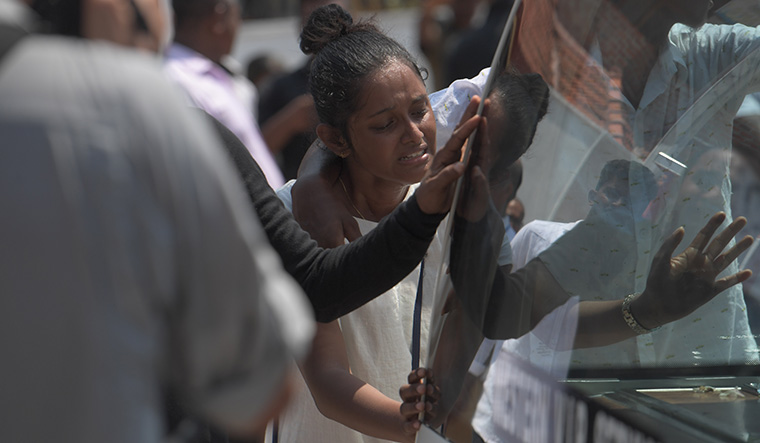BANGLADESH PRIME MINISTER Sheikh Hasina was in Brunei when she was told about the death of her cousin’s grandson in the Sri Lankan terror attacks on April 21. Eight-year-old Zayan Choudhury was at breakfast with his father in one of the hotels targeted by terrorists. Zayan was among the 38 foreign nationals killed in the attacks.
For Hasina, the Sri Lankan bombings went way beyond personal loss. It was eerily similar to the 2016 terrorist attacks that devastated Bangladesh. The perpetrators in both cases were well educated and came from financially sound upper middle-class families. Looking at the alarming similarities, analysts in India feel that New Delhi, too, should be on guard. “There is a lot of affinity between Sri Lanka and southern states like Karnataka, Kerala and Tamil Nadu,” said Arun Choudhary, former special director in the Intelligence Bureau. “The fact that Islamic State has displayed that it is not [geographically limited] and [that it] resonates with local outfits is a matter of worry.’’
While the Sri Lankan government has blamed a small fundamentalist group called the National Thowheed Jamaath for the attacks, Islamic State claimed responsibility three days later. An Indian counterterrorism official said Islamic State was building its violent brand in the region, challenging the well-established Al Qaeda in the Indian Subcontinent (AQIS). Retired diplomat G. Parthasarathy said the attack was retribution for the New Zealand mosque shootings. “That was the first time that Muslims had been killed collectively at a place of worship. It had to hit back,” he said.
Indian agencies had alerted Sri Lankan intelligence officials on April 4 about possible attacks on churches and the Indian high commission in Colombo, after an Islamic State radical disclosed during interrogation that he was associated with Zahran Hashim, a Sri Lankan cleric who was identified as one of the key attackers. The plot came to light after the National Investigation Agency busted the Coimbatore module of Islamic State six months ago and found incriminating material about Hashim, including videos that pointed at impending attacks in Sri Lanka.
On April 23, Islamic State released a video claiming responsibility for the Easter attacks. It showed Hashim with a rifle, leading seven purported attackers, pledging allegiance to Islamic State. “It is a strategy among terror groups to take credit for an attack that has not been claimed by any organisation. Thowheed is a lesser known group, but linking up with Islamic State makes for a potent combination,’’ said Choudhary. Ashok Behuria, who heads the South Asia Centre at the Delhi-based Institute for Defence Studies and Analyses, said Islamic State was using fringe outfits to carry out spectacular strikes like the one in Sri Lanka.
For India, the Sri Lankan crisis also poses a diplomatic challenge, especially because the rift between Prime Minister Ranil Wickremesinghe and President Maithripala Sirisena is widening. Harsh Pant, who heads the strategic studies programme at the Delhi-based Observer Research Foundation, said the president and the prime minister were not coordinating their responses. “Intelligence was passed, but no action was taken. There is something amiss in the way the institutional infrastructure is being managed,’’ said Pant.
India needs to be careful as its ties with Sri Lanka have been somewhat stormy. Last November, Sirisena had alleged that India’s Research and Analysis Wing was plotting his assassination. Although he quickly denied the reports, the allegation came on the eve of Wickremesinghe’s visit to India.
There has been a perception that India is closer to Wickremesinghe, who had promised to revisit the island nation’s burgeoning economic ties with China. The Wickremesinghe government had cancelled several contracts to Chinese companies, while India was offered more projects. This has been one of the reasons behind the rift between Wickremesinghe and Sirisena. The president even replaced Wickremesinghe with former president Mahinda Rajapaksa. While the move failed, there is a strong possibility of someone from the Rajapaksa clan winning the presidential elections scheduled for later this year. Rajapaksa’s party had swept local body polls held in 2018. The national security crisis will further bolster its chances.
This is a scenario that New Delhi will be watching carefully. In 2015, Rajapaksa had accused R&AW of conspiring to defeat him in the presidential elections. In an interview with THE WEEK in January, he said, “In 2014, certain misunderstandings emerged between the newly elected governments [in both countries]. That is something that should not have happened.’’ The prevailing sense of mistrust could be one of the reasons why Indian inputs on the terror attacks were not taken seriously.
India has been working on improving ties with Rajapaksa. Prime Minister Narendra Modi had met him during an official visit to Sri Lanka in 2017. Last September, Rajapaksa, along with his son and heir apparent Namal, had met Modi during a visit to India. But irritants continue to mar ties between the two countries. For the moment, however, there is little India can do, but remain supportive. “We have to be a good neighbour,’’ said Parthasarathy. “We need to respond positively when we are asked for help.”


